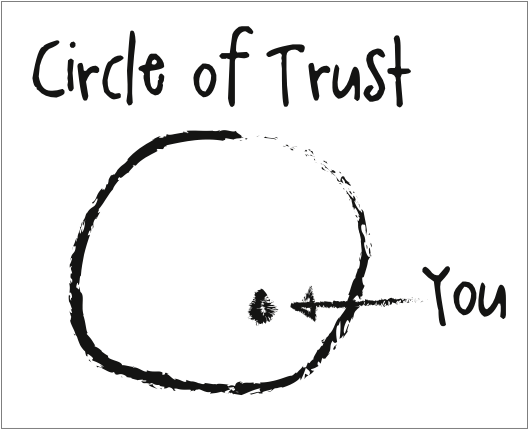The Trust Factor
Posted by Laura Otten, Ph.D., Director on July 3rd, 2020 in Thoughts & Commentary
0 comment
"Trust in Civil Society" Edelman Intelligence Edelman's Annual Trust Barometer Independent SectorSociety seems to be in a period where trust is a tarnished word. Suggest that you trust someone—especially an expert, the media, a government, really anyone other than your own brilliant self—and you will receive looks of pity, as in “How could you be so stupid? Don’t you know that everything is fake?” But if trust is no more, then nonprofits are bankrupt.

“Trust our currency” is something I say incessantly. If a nonprofit loses the trust its clients, donors, partners, and others, it loses its ability to continue. We trade in trust; people give us money because they trust us; clients chose us because they trust us; others want to work with us because they trust us. Trust allows us to keep on ticking.
While trust is always important, it becomes even more so in difficult times like now. Times when so many are struggling to stay afloat, competing for dollars, trying to keep the doors open. During these times, the competition intensifies, making that trust factor more important than ever.
While the latest study on trust and nonprofits doesn’t tell us anything new or startling, the findings in Independent Sector’s report, “Trust in Civil Society,” are well worth consideration. This report looked at trust in two divisions of the sector: philanthropy, defined as foundations, both corporate and private, and high net worth individuals, and nonprofits. This post speaks to the findings on the latter.
The research was actually done by Edelman Intelligence, the same group that puts out the annual trust barometer. The report involved 3000 adults who each received a 15-minute online survey the first week in December 2019. So, could thinking have changed since then, given all that has happened? Probably not, given that, as noted before, nothing new or startling was uncovered this time around.
But the findings will sound familiar, with messages that deserve to be repeated until people are willing to accept them as truth and adjust their approaches accordingly. The good news is that nonprofits continue to be trusted by most people, with 50% having a high degree of trust. This trust is based on several factors: nonprofits are helping others; working on behalf of the greater good; having a track record of success; and being morally responsible.
The flip side—why some folks have low trust in nonprofits—is their lack of financial transparency, association with scandals, perception of being greedy, and having had a bad personal experience with a nonprofit, or having heard about or witnessed such an experience. In these basic findings, once again, there is instruction on what every nonprofit must do its day-to-day operations and in its story-telling.
As others before it, this study found that high trust in a nonprofit leads to greater volunteerism and giving. Ah, yet more proof that trust is currency. What increases trust? Having positive engagements with the nonprofit. Again, there is instruction here, instruction that can be put into practice even in a pandemic and a world that continues to require masks and social distancing.
The study uncovered five things that significantly and positively drive a person’s trust in a nonprofit.
- The organization’s mission meets a clear need
- The organization is present in a person’s local community
- A person can relate to the organization
- The organization demonstrates accountability to its donors and others
- The organization has a “high effectiveness rating” from watchdog groups
There were also three “hidden motivators” operating to increase trust:
- The organization works in underserved communities and with people of color
- The organization is endorsed and/or supported by celebrities or public figures
- The organization works all around the country.
Before getting too excited about these drivers and how you can demonstrate them in your outreach, let’s look at the illogic of some of them. What it is most disappointing in these eight drivers is that they give nonprofits a pass in a key area of extreme importance: impact. Is this nonprofit actually doing what its mission—that is clearly needed—says it will do? Is it meeting its promises in general and in each of its programs? Neither receiving a highly effective rating from a watchdog group, nor being accountable to donors, addresses the question of whether or not program A is achieving the promised goals of B, C and D.
No matter how much a mission may be needed, or is present in the community, or is relatable, if the organization simply talks a good talk but isn’t walking the walk, why should it be trusted? And as I watch smaller, community-based nonprofits be gobbled up by bigger organizations, bigger nonprofits, while quality and amount of service decline in the local community, I question whether working locally and nationally best serves those present in supporters’ communities and should be fueling trust, rather than questioning trust.
Which leads me to the one finding that was new and truly interesting: more than 1/3 (36%) of folks in this survey group see “ordinary people”—not nonprofits—as those best positioned to make change. Nonprofits came in third, with only 12% seeing them as the vehicle for change, following government (20%), but ahead of private foundations and high net worth individuals (12%) and businesses, including their corporate foundations (5%). This suggests that as a sector we have a lot more work to do when it comes to trust—and showing people just how much change we are making.
The opinions expressed in Nonprofit University Blog are those of writer and do not necessarily reflect the opinion of La Salle University or any other institution or individual.
